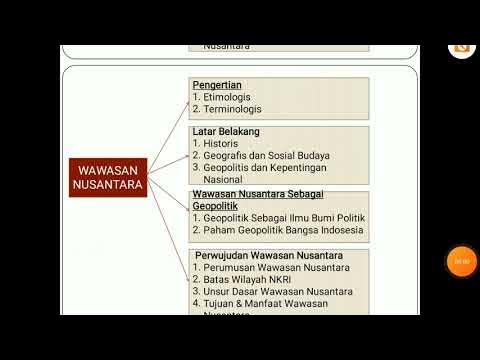Perspektif Hak Asasi Manusia
Summary
TLDRThis lecture explores the concept of human rights from the perspective of Indonesia's legal and philosophical foundations. It examines how Indonesia recognized human rights even before the United Nations Universal Declaration of Human Rights in 1948, referencing its inclusion in the 1945 Constitution. The discussion highlights the challenges in applying human rights across the global south and the difference between Western and Third World views on individual versus collective rights. The lecture underscores the importance of balancing individual and collective rights and reflects on how Indonesia's philosophy of Pancasila shapes its human rights perspective.
Takeaways
- 😀 Indonesia recognized human rights before the Universal Declaration of Human Rights (UDHR) in 1948, with a focus on the nation's constitutional commitment to these rights.
- 😀 The Indonesian Constitution (UUD 1945) highlights human rights through the Preamble and various articles, reflecting a longstanding commitment to human dignity and justice.
- 😀 The principle of human rights is rooted in the nation's struggles for independence, emphasizing freedom and equality for all people as fundamental rights.
- 😀 The post-colonial world saw a divide between Eastern (Soviet) and Western (American) ideologies, impacting global perspectives on human rights.
- 😀 Human rights face challenges in third-world countries, where ideological and geopolitical factors influence the application of these rights.
- 😀 Universality versus particularism: Universalists believe human rights are inherent and apply to all humans, while particularists argue they are shaped by cultural, historical, and societal contexts.
- 😀 Universalist perspectives emphasize individual rights, such as the right to life and freedom, asserting that these are innate and must be protected by law.
- 😀 Particularist views focus on collective rights, seeing individuals as part of larger groups like families or communities, and emphasize duties and responsibilities within those groups.
- 😀 Indonesia's human rights perspective is deeply influenced by Pancasila, which balances individual and collective rights within the context of social harmony.
- 😀 The Indonesian Constitution links human rights with social responsibilities, reflecting a holistic view of individual freedoms in relation to the nation's welfare and collective progress.
Q & A
What is the main topic of the lecture presented in the transcript?
-The main topic of the lecture is the perspective on human rights, particularly in the context of Indonesia, its historical background, and the challenges faced by countries in implementing human rights norms.
What significant historical event regarding human rights is mentioned in the script?
-The script mentions the Universal Declaration of Human Rights (UDHR) adopted by the United Nations in 1948, but also emphasizes that Indonesia had already declared human rights in its 1945 Constitution, even before the UDHR.
How does Indonesia's 1945 Constitution relate to human rights?
-Indonesia's 1945 Constitution enshrines human rights by stating that 'freedom is the right of all nations,' which aligns with the principles of human rights. The Constitution also includes various provisions that protect human rights, reflecting Indonesia's commitment to human dignity.
What is the challenge Indonesia faces in implementing human rights, according to the lecture?
-Indonesia faces challenges in implementing human rights due to the broader global context, particularly the East-West divide and the North-South divide, which influence differing perspectives on human rights implementation in third-world countries.
What is the difference between the Western and third-world perspectives on human rights?
-The Western perspective on human rights is more individualistic, focusing on individual freedoms and rights. In contrast, the third-world perspective emphasizes collective rights and responsibilities, which are shaped by cultural and historical contexts.
How do the concepts of universality and particularism relate to human rights?
-Universality in human rights suggests that human rights are inherent to all people, regardless of their culture or background, whereas particularism argues that human rights norms are shaped by specific cultural, historical, and social contexts, and thus may differ between societies.
What is the Indonesian viewpoint on human rights as mentioned in the lecture?
-Indonesia's perspective on human rights is based on Pancasila, which emphasizes a balance between individual rights and collective responsibilities. This viewpoint reflects the idea that human rights cannot be separated from the social and national context.
How does the script define the relationship between human rights and duties?
-The script suggests that human rights are inherently linked to human duties. While individual rights are emphasized, they must also align with the collective responsibilities of society, reflecting a balance between individual freedoms and social obligations.
What role does Pancasila play in Indonesia's understanding of human rights?
-Pancasila, as Indonesia's state ideology, underpins the country's understanding of human rights by promoting a vision of human dignity, freedom, and social harmony. It reflects the idea that human rights are not just individual freedoms but also part of a broader social and national framework.
What is the significance of the concept of 'revolution of humanity' in the context of Indonesian history?
-The concept of 'revolution of humanity' refers to Indonesia's struggle for independence, where the revolution was not only political but also a fight for the human dignity and rights of the Indonesian people, symbolizing a deep commitment to human rights rooted in the country's history of colonization.
Outlines

This section is available to paid users only. Please upgrade to access this part.
Upgrade NowMindmap

This section is available to paid users only. Please upgrade to access this part.
Upgrade NowKeywords

This section is available to paid users only. Please upgrade to access this part.
Upgrade NowHighlights

This section is available to paid users only. Please upgrade to access this part.
Upgrade NowTranscripts

This section is available to paid users only. Please upgrade to access this part.
Upgrade Now5.0 / 5 (0 votes)





